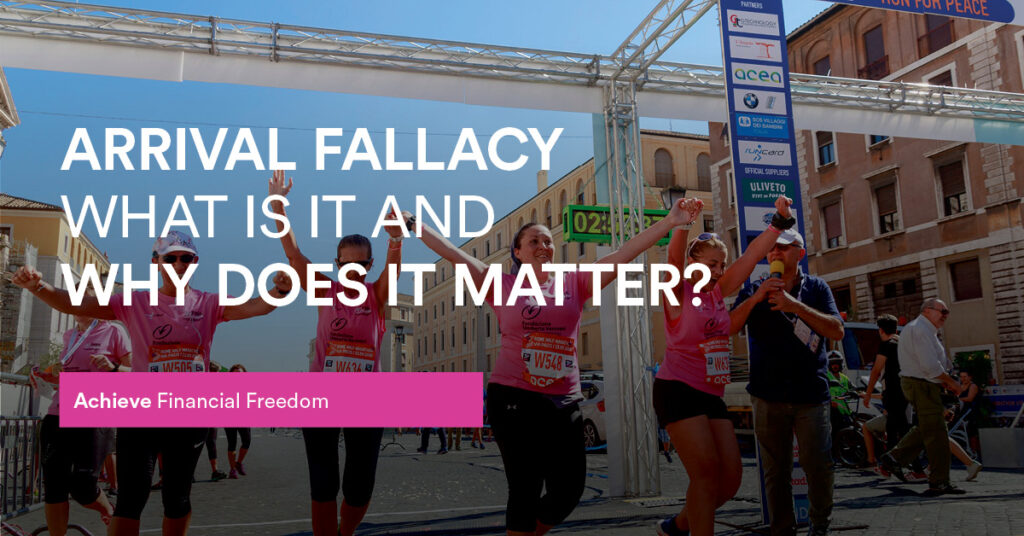Answer this truthfully. How many times can you remember thinking that “I’ll be happy when…..”. We’ve all done it, more than once, I’ll bet. In fact, it’s so common for people to consider that their happiness will be better when they reach a certain goal, it has a name. Arrival fallacy.

What is arrival fallacy?
“Arrival fallacy is this illusion that once we make it, once we attain our goal or reach our destination, we will reach lasting happiness.”
Tal Ben-Shahar
Whether it’s losing weight, climbing the career ladder or focusing on financial independence, we’re becoming ever more goal orientated. The good news is that many of us are achieving and realising these goals. But what happens when you do achieve them?
Those of us on the journey towards financial independence spend years, sometimes decades working towards a singular goal. That goal is of course financial freedom and all the opportunities that affords us. In other walks of life, Olympians train from an early age to achieve their goal of competing in and winning Olympic medals. They dedicate their lives in the pursuit of their chosen sport or discipline. Once the Olympics concludes, many find themselves in a state of unease or depression. They prepared for the event, but not what comes next.
We expect that when we reach our goals, doors will open and a marching band will celebrate our success with one more epic tune. To be honest, I’d be happy with a pat on the shoulder. The reality is that the moment is just that. A momentary occasion. A second later it means nothing more and the past 10 years of effort, while achieved, are history.
I am a goal-setter and in the past few years, I’ve achieved the goals I set for myself. I paid off my mortgage, became financially independent and retired early. Am I the happiest I’ve ever been? Actually yes, I’m pretty fucking happy with myself, but there are of course periods when I think to myself…. what do I do next. With all the time in the world as an early retiree, I think about this a lot.
Overcoming the fallacy of arrival
The problem with the arrival fallacy is that we put pressure on ourselves to achieve goals. For the most part, no one else is forcing us, it’s a personal thing. We fantasise about what the future looks like and how much better everything will be when we reach the goal. Thinking that things will be so much better when you no longer have to work 40 hours a week is a partial truth. Yes, the stress of the working world will drift away, but as humans, we tend to replace one thing with another. Unless you put the effort in to address this. Heres how I’m working on this right now.
Enjoy the journey
Being focused on the end result is one thing. You can of course look forward to showing off your 6-pack on the beach or drinking mai tai’s for days on end (whatever your goal looks like is fine). But you must also enjoy the journey.
“It’s not the destination, it’s the journey”
Ralph Waldo Emerson
We can’t reach our goals without going through the process. Nor can we reach our destination without undertaking a journey. Somewhere along the way, the destination became the primary focus, but the journey is equal to, if not more important. As we move to achieve our goals we grow, develop new skills and become the person we want to be.
Should there even be an end? We are always growing and evolving. Should there be a definition of completion? Probably not.
Making the journey enjoyable is critical to achieving our goals. Also realising that the current goal is just the next step in a continuous cycle of growth.
Decouple your arrival from happiness
When we build up long-term goals and the expectation of our happiness when they are completed, we are setting ourselves up for disappointment. Our acute expectations of this joyous event will rarely be met and we can’t hinge our future happiness on what might happen. Many authors in this space give consideration to being grateful for the here and now. What are you thankful for this moment and why? These authors promote the use of mediation or journalling to remind themselves of their progress. It’s not something I’ve tried personally but I understand the premise and how it could work.
Gamification of goals
Who doesn’t want to win the game? Whatever the “game” means to you is of course personal, but the principles remain. We put in serious effort and strive to achieve them. The challenge is that while we understand video games aren’t the be all and end all, our goals are considered as such.
Gamifying goals allows us to manage our own expectations and to celebrate the wins as we “level-up”. As you progress through a video game, you should naturally become better at the game (unless it’s me as COD and I’m still as bad as I’ve ever been). You become more attuned to the skills needs and those challenges you faced before become easier to overcome.
What happens when you finish a video game? Do you try and better your past wins? Or you might switch games altogether. What you don’t do, is put down the controller and give up forever.
Manage expectations – Is good enough, good enough?
Most people overestimate what they can achieve in a day but underestimate what they can accomplish over the long term. Setting healthier goals doesn’t mean less ambition. What it means is that you have really given consideration to your goal setting and you plan the steps to achieve them, therefore setting reasonable expectations of yourself.
You can’t control what you can’t control
Me
Don’t set yourself up for disappointment. But focus on realistic achievements you can plan and focus on. Break these down into sub-goals and celebrate each win as you achieve it.
Final thoughts
The arrival fallacy is real and I’ll tell you this for free. It can do one. I’ve built up major milestones in my life and when I achieved them, they were some of the most underwhelming events ever. Looking back I understand that the focus should always be on the journey because its value is entirely equal to or greater than the goal.

